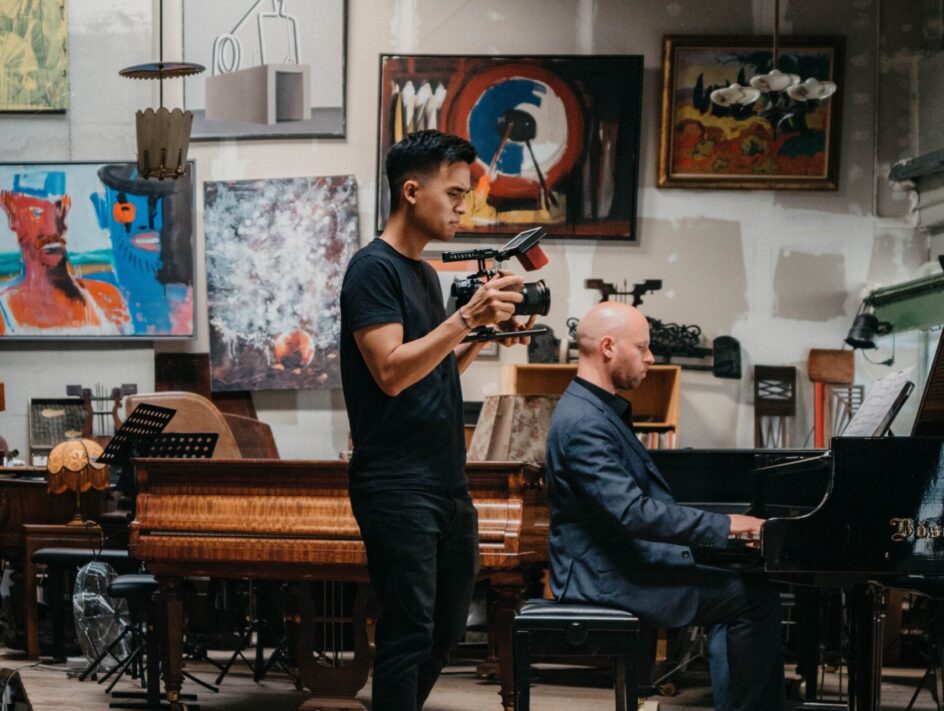COLUMBUS, OH—The three-year partnership between Ohio Humanities and the Wexner Center for the arts to support Ohio’s robust filmmaking community continues with a call for entries for the 2025 Ohio Humanities Film Fellowship.
The fellowship program assists independent filmmakers working on documentaries informed by the humanities around and about Ohio. It provides funding of up to $5000 as well as support and mentorship from the center’s Film/Video staff and the Film/Video Studio, the Wex’s in-house postproduction facility. The fellowship supports up to five fellows at the Wex each year. Entries will be accepted Friday, November 1 through Friday, December 20.
“The Film Fellowship provides a unique opportunity to connect emerging filmmakers with the resources they need to tell the stories of our shared human experience, strengthen communities, and help bridge divides,” says Ohio Humanities Executive Director Rebecca Brown Asmo. “We are proud to continue supporting these innovative creators as they explore important Ohio stories.”
Eligible projects must have a connection to Ohio or cover a topic that is highly relevant to Ohioans. Humanities-informed documentary film projects engage audiences with ideas and frameworks that tell stories of our shared human experience and help bridge divides.
In the first two years of the partnership, the fellowship program has supported a rich range of storytelling by filmmakers at all career stages, including:
- Family White Elephants, a thoughtful, touching consideration of Columbus artist Mary Jo Bole’s family history through the artifacts she’s inherited, had its world premiere at the Wex in April.
- Zeinabu irene Davis’s Stars of the Northern Sky follows the legal trials of Sojourner Truth, Phyllis Wheatley, and Marie Joseph Angelique. It began shooting earlier this year in Akron.
- Athens-based, Filipino-American filmmaker Eli Hiller, who’s deep into production for Becoming Us, a documentary in which he attempts to reconcile his racial identity by searching for his biological father.
- Holding on to Water, Kiubon Kokko’s exploration of how family history and trauma has impacted his experience as a first-generation Asian American in Dublin, Ohio, which is currently in production.
- Animator and Ohio University Assistant Professor of Film Production Lindsey Martin is at work on Doorknob, a short that combines the history of Ohio pottery towns with Appalachian folktale traditions.
- Benny Zelkowicz, an experienced animator and lecturer at Ohio State’s Advanced Center for Computing and Design (ACCAD), has just completed The Sacred Society, which uses sand animation to share the story of the Chevra Kadisha, a group of volunteers who perform Jewish burial rituals.
“It’s been a rewarding experience to get to know these filmmakers and to help them in their work,” says Wexner Center Film/Video Studio Director Jennifer Lange. “We’ve seen how these fellows, regardless of their experience levels, have flourished with additional funding and the unique support available from the Film/Video Studio and the small staff of editors with whom I’m fortunate to work. We’re excited to see what this next call for entries brings.”
A submissions portal and more information about entry guidelines is available at wexarts.org and through Ohio Humanities. Filmmakers chosen for the fellowship will be notified in February.
For more information about the fellowship program and other grants available through Ohio Humanities, please visit ohiohumanities.org.
Press contacts
Kiley Kinnard, Communications Manager, Ohio Humanities
kkinnard@ohiohumanities.org
Melissa Starker, Creative Content & PR Manager, Wexner Center for the Arts
mstarker@wexarts.org
About Ohio Humanities
Ohio Humanities is a statewide nonprofit that shares stories to spark conversations and inspire ideas by hosting programs and awarding grants that support storytellers statewide, from museums to journalists to documentary filmmakers.
About the Wexner Center for the Arts
The Wexner Center for the Arts at The Ohio State University is devoted to commissioning new works of art, artist residencies and the presentation of exhibitions, performing arts, film/video and learning programs. Housed in the first major public commission by architect Peter Eisenman, the WCA’s iconic building reflects the center’s ambitions to reimagine what a contemporary cultural space could be. The WCA serves regional, national, and international artists and communities and is supported by public funders, donors, sponsors, and members.

